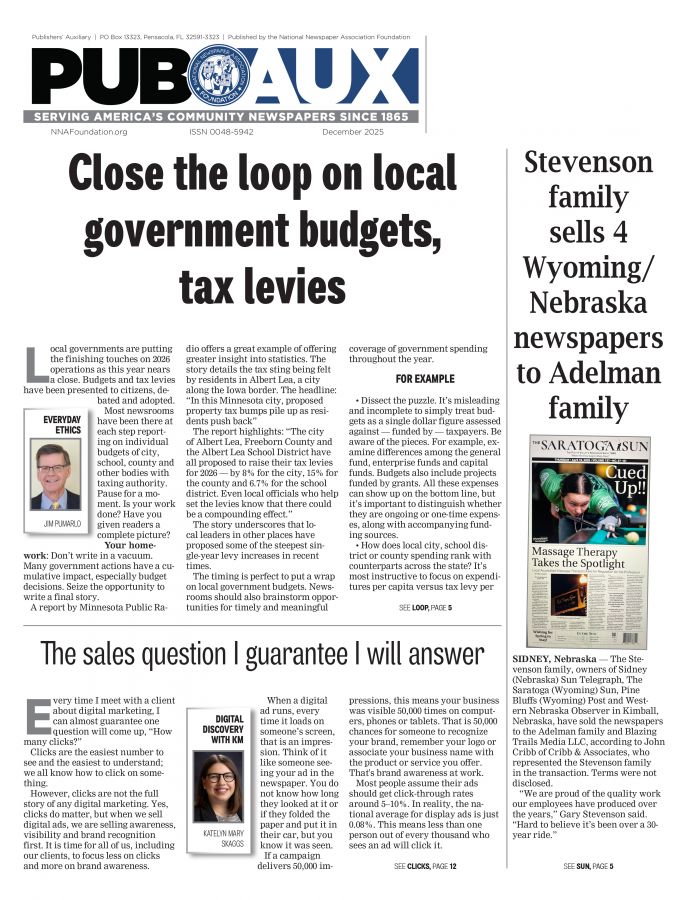Tax Reform is Completed without a Tax on Advertising
Dec 20, 2017
Congress has recognized the importance of advertising in the U.S. by electing not to impose a new tax on this economic driver, according to National Newspaper Association President Susan Rowell.
Congress adopted the Tax Cuts and Jobs Act of 2017 in mid-December. The president’s signature is expected shortly after Congress completes one last step to waive its own requirement for tax cuts to be paid for with other revenues. That waiver could happen in a year-end spending bill, or could be held over to January.
NNA’s Rowell, publisher of The Lancaster News, Lancaster, SC, expressed her appreciation to several members of Congress, including Reps. Vern Buchanan, R-FL; Mike Kelly, R-PA; and JimRenacci, R-OH, as well as many others for arguing against advertising taxes in the tax reform bill. Proposals for a change in advertisers’ ability to deduct advertising expenses had swirled around the tax writing committees for the past three Congresses, as various proposals to raise federal revenue were considered.
She also thanked many NNA members and their congressional delegations who heard presentations during the past three years on the importance of advertising. NNA’s Government Relations chairs during the past two congressional terms were Andrew Johnson, publisher of the Dodge County Pionier, Mayville, WI; Mike Fishman, publisher of the Morristown (TN) Citizen-Tribune; and Matthew Paxton, publisher of the News-Gazette, Lexington, VA.
In addition, she acknowledged the leadership of James Davidson, a leading tax expert with the law firm Polsinelli, who heads the media industry’s The Tax Coalition, which fights advertising taxes at the state and federal levels.
“We know we had a lot of friends in Congress who understand that taxing advertising in a bill intended to expand the economy would have been disastrous,” Rowell said.
NNA took no position on other provisions in the tax bill, though it followed various proposals for tax levels of pass-through corporations, such as Subchapter S, private partnerships and limited liability corporations. At the outset of the tax debate, NNA had informed the two tax-writing committees of its concerns about three items:
- Preserving the full expensing of advertising expenditures in the year spent.
- Maintaining several levels of passthrough tax, rather than a flat 15 percent tax, which NNA said would actually increase taxes for some members struggling to maintain profitability.
- Avoiding an unfair border tax on newsprint supplies.
“We did well, overall,” Rowell said. “There is no ad tax. The passthrough businesses are allowed a 20 percent deduction of their revenues from the personal tax rate, which will be set as low as 10 percent over the 10 years of individual taxation under this law. There is no border tax, although we are now fighting a tariff that did not come from this bill. In essence, on all three of our concerns, we emerged with considerable success. I will caution that this bill is complex and NNA members will need to consult with their accountants to determine specifically how they will be affected. We may see provisions in the bill that will need correction in future Congresses, but at the moment, we are relieved this long campaign has seen a successful end.
“These were enormously complex negotiations and the bills being voted on were often in excess of 1,000 pages. The ad tax proposition was an existential issue for us, as we realized it would unfairly hit our customers’ budgets and ultimately cause a reduction in revenue for our news operations. The other issues were also important, but we were prepared to go to the mat to defend advertising. I’m really pleased that Congress recognizes the essential truth of our economy: advertising drives sales and sales drive overall economic activity.”
Contact: Tonda F. Rush (tonda@nna.org)






